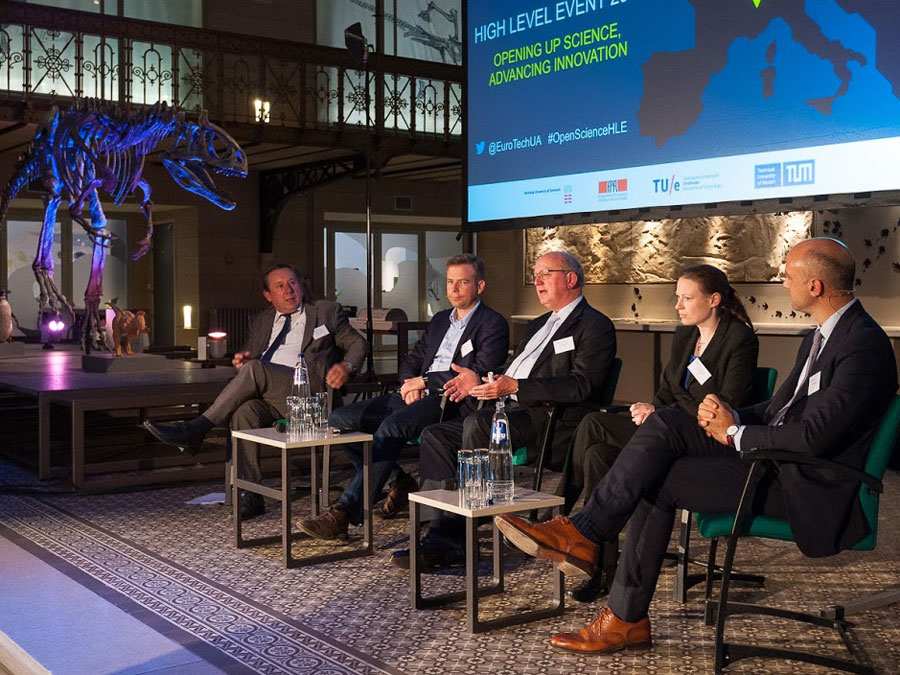EuroTech Universities: EU should provide sustainable funding for Open Science models
Opening up Science

The concept of Open Science is that the entire scientific process, from the initial idea to final publication, is made transparent to the public and open to involvement, even of non-scientists. Methodologies and process steps are documented (Open Methodology), data and technologies enter the public domain (Open Data, Open Source), research results are openly reviewed and published (Open Peer Review, Open Access).
As one of the key priorities for EU research and innovation policy, Open Science attempts to capture the tremendous changes currently experienced in the scientific world. These changes are linked to an ever-increasing amount of data, the availability of digital technologies, the growing number and interconnectedness of actors engaged in science, as well as the need to rapidly and transparently address the concerns of today’s society.
“Technical universities’ historical closeness to industry makes it especially easy for them to follow Open Science principles”, says Jan Mengelers, President of Eindhoven University of Technology at this year’s High Level Event of the EuroTech Universities Alliance. “Sharing research more openly not only benefits science; it also allows for industry to harness the so-called wisdom of the crowd. However, we also witness a certain nervousness of our industrial partners about the potential loss of exclusive rights and thus competitive advantage,” explains Mengelers. “Open Science means finding a delicate balance.”
Call for partial reassignment of the EU’s Framework Program for Research
“We need to make sure Europe’s researchers are provided with the right skills and proper recognition for engaging in this challenging universe,” recognizes Wolfgang Burtscher, Deputy Director General for Open Innovation, Open Science & Open to the World at the European Commission. “Researchers are the key players when it comes to putting Open Science into practice.”
For researchers to continue taking up this challenge and to ensure that Open Science is a springboard for future innovation opportunities, it is vital, according to the EuroTech Universities Alliance, that the EU commits to sufficient long-term funding. More concretely, a higher proportion of the Framework Program’s budget should be allocated to collaborative solution-oriented research at lower Technology Readiness Levels.
TUM researcher: “Entrepreneurs can bridge the gap between science and society”
However, the open approach to research results alone does not guarantee their benefit for society, emphasized Nicola Breugst, Professor for Entrepreneurial Behavior at TUM, during the discussion meeting. “Is communication at a deeper level with other groups of society of different technical and cultural backgrounds and with different interests even possible? This requires building bridges between everyone involved. Universities must be equipped with the necessary means to build these bridges and to enable students and scientists to recognize and use them.”
According to Breugst, entrepreneurs play an important role in this respect: “Their entrepreneurial pioneering spirit could allow them to carry research results ‘across the bridge’ into society. And these entrepreneurs could well be students and researchers themselves.”
REACH harmonizes 17 different areas of knowledge
An endeavor that is worth the effort, as highlighted by selected scientists from across the EuroTech Universities while showcasing the Open Science dimensions of their projects at the event. For example, the Horizon 2020 project REACH is developing technologies to prevent health problems for elderly people using body sensors and real-time data analytics. This project is built on a core team from the four EuroTech Universities together with industry and health care partners from across Europe. Seeking to harmonize 17 different areas of knowledge, REACH is a prime example of how an international strategic partnership of universities is instrumental in connecting expertise in data and digital technologies with other disciplines and sectors to bring solutions to European society.
More information:
EuroTech Universities Alliance
The October issue of Technologist, the magazine of the EuroTech Universities Alliance, will cover the discussion about Open Science in detail. Forthcoming on www.technologist.eu
Contact:
Emily Palmer
EuroTech Universities Alliance
Head of Brussels Office
Phone: +32 2 274 0532 or +32 472 584 463
Emily.Palmer@eurotech-universities.eu